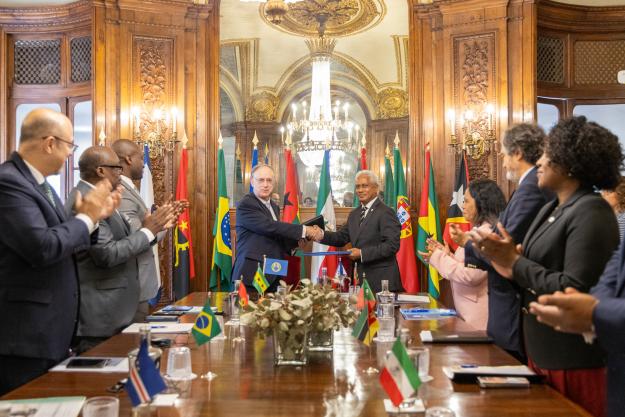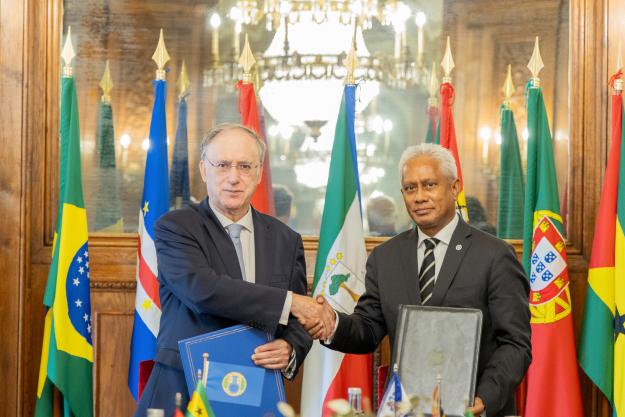The Technical Secretariat of the Organisation for the Prohibition of Chemical Weapons (OPCW) and the Executive Secretariat of the Community of Portuguese Language Countries (CPLP) have signed a Memorandum of Understanding (MoU) in Lisbon, Portugal, on 3 June 2025. The MoU was signed by CPLP Executive Secretary, Ambassador Zacarias da Costa and OPCW Director-General, Ambassador Fernando Arias, during his official visit to the CPLP Headquarters, in the presence of Ambassadors, Permanent Representatives of the CPLP member states.
The MoU, in line with the respective mandates and competences of the OPCW Technical Secretariat and the CPLP Executive Secretariat, establishes a framework for cooperation in areas of mutual interest. Within this framework, the OPCW and the CPLP agree to cooperate at the operational level to support the practical efforts for their shared objectives, with the aim of ensuring the full implementation of the Chemical Weapons Convention (CWC) in all CPLP Member States.
The MoU identifies the following areas for enhanced cooperation: increasing awareness and understanding of the obligations under the CWC among CPLP Member States; strengthening the CWC-related capacities of customs authorities; and facilitating the exchange of scientific and technical information related to the development and application of chemistry for purposes not prohibited under the Convention, among other initiatives.
During the signing ceremony, Executive Secretary da Costa stated: "The CPLP and the OPCW have a common commitment to the universal values of peace and security, human rights, and diplomatic dialogue. Peace and security are fundamental for achieving our primary objective: contributing to the development of our Member States. This MoU reaffirms the determination of CPLP Member States in this regard and introduces a dimension of multilateral cooperation between our two organisations. It provides an operational instrument that will allow us to align efforts and implement activities that add tangible value to the full implementation of the CWC."

Ambassador Fernando Arias, OPCW Director-General, and Ambassador Zacarias da Costa, CPLP Executive Secretary, with Ambassadors and Permanent Representatives during a ceremony for the signing of a Memorandum of Understanding (MoU) between the Organisation for the Prohibition of Chemical Weapons (OPCW) and the Community of Portuguese Language Countries (CPLP) in Lisbon, Portugal, on 3 June 2025. (Photo: CPLP)
Director-General Arias stated that, "The CPLP and the OPCW share a common vision of multilateralism and joint efforts to advance international peace and security. All nine CPLP Member States are States Parties to the CWC, and many of them were among the earliest to join the treaty, demonstrating their firm commitment to upholding the global norm against chemical weapons. I express my sincere gratitude to the Portuguese-speaking countries for their steadfast political and practical support in helping the OPCW fulfil its mandate, including their valuable contributions to the construction of the OPCW Centre for Chemistry and Technology."
The Director-General emphasised, "The MoU we signed today demonstrates how collective efforts can yield meaningful progress in consolidating the international norm prohibiting chemical weapons. It will enhance CWC-related cooperation between the OPCW and the CPLP, as well as among CPLP Member States. We are pleased to note that, among other benefits, this agreement will support the Portuguese-speaking countries' efforts in CWC implementing legislation, and facilitate their participation in the OPCW's assistance and protection capacity-building programmes."
The signing ceremony was attended by the Permanent Representatives of the CPLP Member States and other senior officials of the Executive Secretariat. Director-General Arias received a warm welcome during his visit to the CPLP Headquarters.
The Director-General also held an informal dialogue with the Permanent Representatives of CPLP member states. They exchanged views on existing challenges related to the implementation of the CWC, and acknowledged that the use and threat of use of chemical weapons remain ongoing international concerns. In this regard, the Director-General provided an overview of the OPCW's latest efforts to bring the Syria chemical weapons dossier to a conclusion.

Ambassador Fernando Arias, OPCW Director-General, and Ambassador Zacarias da Costa, CPLP Executive Secretary, during a ceremony for the signing of a Memorandum of Understanding (MoU) between the Organisation for the Prohibition of Chemical Weapons (OPCW) and the Community of Portuguese Language Countries (CPLP) in Lisbon, Portugal, on 3 June 2025. (Photo: CPLP)
Director-General Arias also briefed participants on the actions taken by the OPCW to better adapt to emerging challenges posed by new technologies, particularly artificial intelligence (AI). He emphasised the key role of the OPCW ChemTech Centre in maintaining the Organisation's technical preparedness for the future.
The discussions also highlighted the importance of adopting and enforcing comprehensive national implementation measures. The Director-General underscored the OPCW's continued support for legislative assistance to its Member States. They further discussed the OPCW's capacity-building programmes, and the Director-General welcomed the continued active participation of Portuguese-speaking countries.
Background
Portuguese-speaking countries have played an important role in the OPCW's initiatives. Recent activities included a regional course on emergency response to chemical incidents in Luanda (June 2022), a workshop in Lisbon focused on advancing national legislation to implement the Convention (February 2024) and an advanced assistance and protection course for first responders (April 2024). In December 2024, a training workshop for customs officials was also held in Luanda. Looking ahead, in July 2025, São Tomé and Príncipe will host a general training course for Portuguese-speaking countries, targeting National Authorities and stakeholders involved in implementing the Convention, with active support from the CPLP Secretariat.
As the implementing body for the Chemical Weapons Convention, the OPCW, with its 193 Member States, oversees the global endeavour to permanently eliminate chemical weapons. Since the Convention's entry into force in 1997, it is the most successful disarmament treaty eliminating an entire class of weapons of mass destruction.
In 2023, the OPCW verified that all chemical weapons stockpiles declared by the 193 States Parties to the Chemical Weapons Convention since 1997 - totalling 72,304 metric tonnes of chemical agents - have been irreversibly destroyed under the OPCW's strict verification regime.
For its extensive efforts in eliminating chemical weapons, the OPCW received the 2013 Nobel Peace Prize.






